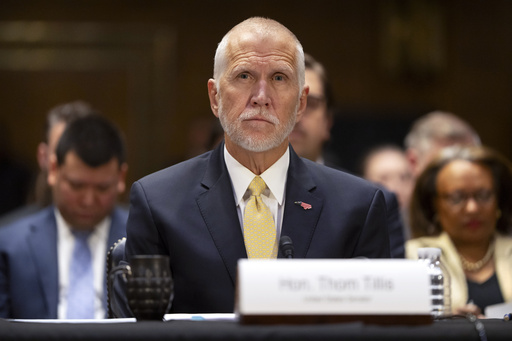
OKLAHOMA CITY — During their campaigns in North Carolina, both Kamala Harris and Donald Trump sought support from the Lumbee Tribe, a state-recognized group with around 55,000 members. Their backing could have been decisive in the tight race. Trump, in September, made a pledge to sign a bill granting the Lumbee federal recognition, a move that would open the door to federal resources. He eventually won North Carolina by a margin of over three percentage points, aided by strong backing from Lumbee voters.
As Trump heads back to the White House in January, the fulfillment of this promise is now under scrutiny. With Republican allies in Congress rallying behind the issue, the Lumbee Tribe and other tribal nations across the nation are closely monitoring what actions will follow. Traditionally, tribal nations obtain federal recognition through an application process managed by the Department of the Interior. However, the Lumbee Tribe has long sought to bypass this route by seeking recognition through Congress. Chairman John Lowery criticized the Interior process as “flawed” and excessively protracted, asserting that Congress should address what he describes as a historic injustice.
“It’s just insane that we’re still fighting for this recognition, and I assure you, I am serious about this in 2024,” Lowery remarked. Following the recent presidential election, the Lumbee Tribe hopes to gain momentum for their cause, even though they confront entrenched opposition from other tribal nations nationwide.
Questions loom regarding Trump’s forthcoming actions. Several recognized tribes, including the only federally acknowledged tribe in North Carolina, contend that if the Lumbee Tribe is seeking federal recognition, it must adhere to the official protocol set by the Department of the Interior. A source familiar with Trump’s views indicated that as president-elect, Trump would likely require the Lumbee to follow this established process, suggesting he wouldn’t sign a bill for their recognition. This source spoke on the condition of anonymity due to the lack of authorization for commentary on Trump’s stance.
Karoline Leavitt, Trump’s spokesperson, stated that “no policy should be considered official unless it originates directly from President Trump.” Achieving federal recognition is crucial for the Lumbee Tribe, as it would grant access to resources like healthcare through Indian Health Services and facilitate the establishment of trust land, which includes reservations. Yet, for this to happen, a tribal nation needs to successfully submit an application to the Office of Federal Acknowledgment within the Department of the Interior.
The Lumbee Tribe has previously sought federal recognition; however, their application was denied in 1985 because it failed to demonstrate a historical connection to any established tribe in the area. In 2016, the Interior Department overturned a previous decision that barred the Lumbee from reapplying, but they have chosen to pursue congressional action instead.
While obtaining federal recognition through legislation is uncommon, it is not unprecedented. The Lumbee’s legislative path has ignited ongoing debates in both Congress and Indigenous communities regarding Indigenous identity and tribal legitimacy. Members from both political parties in Congress have rallied behind the Lumbee’s recognition, including Republican Senator Markwayne Mullin from Oklahoma, who is a member of the Cherokee Nation and actively campaigned for Trump in North Carolina.
However, one of the Lumbee Tribe’s staunchest congressional allies is Republican Senator Thom Tillis from North Carolina, who is facing reelection in 2026. He introduced the Lumbee Fairness Act last year and has consistently supported the Lumbee cause. Various tribal leaders, lobbyists, and advocates have claimed that Tillis has indicated he would block certain legislative efforts backed by other tribes unless their leaders express support for the Lumbee’s recognition.
One specific issue Tillis is purportedly prepared to obstruct is a land transfer enabling the Tennessee Valley Authority to return 70 acres to the Eastern Band of Cherokee Indians, the only federally recognized tribe in North Carolina. This land is part of the tribe’s ancestral homelands, and contains significant cultural history. Principal Chief of the Eastern Band of Cherokee Indians, Michell Hicks, expressed outrage over Tillis’s position, foreshadowing potential retaliatory measures against tribal legislation adding that Tillis had previously promised to halt any bills affecting the Eastern Band unless he garnered their backing for the Lumbee.
Hicks and other tribal leaders have raised concerns about the Lumbee’s claims to historical identity, insisting that recognition cannot come at the expense of questioning their own tribal lineage. Over the years, three recognized Cherokee tribes have severed ties with the Lumbee, protesting against their federal recognition efforts. Tillis has recently delayed a bill aimed at preserving the historic Wounded Knee massacre site while highlighting that ongoing efforts within tribal leadership were stalling progress for the Lumbee Tribe.
In response to criticism, Senator Tillis pointed out what he perceives as manipulations by tribal leaders who oppose Lumbee recognition for their self-interest, suggesting external influences, including a so-called “casino cartel.” He has threatened to disclose the names of tribal leaders and representatives he believes are obstructing his initiatives.
In a rebuttal, Wilson Pipestem, an attorney linked to the Eastern Band, called on Tillis to apologize for what he deemed misleading accusations. Lowery acknowledged Tillis’s interventions but stated these actions were not under Lumbee direction. “If he’s put a hold on any bill, it’s because he consulted tribal leaders, and they evidently conveyed their stance against his legislation,” explained Lowery.

